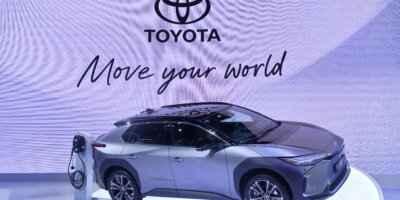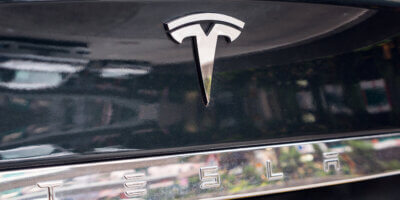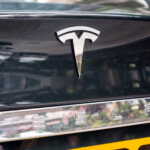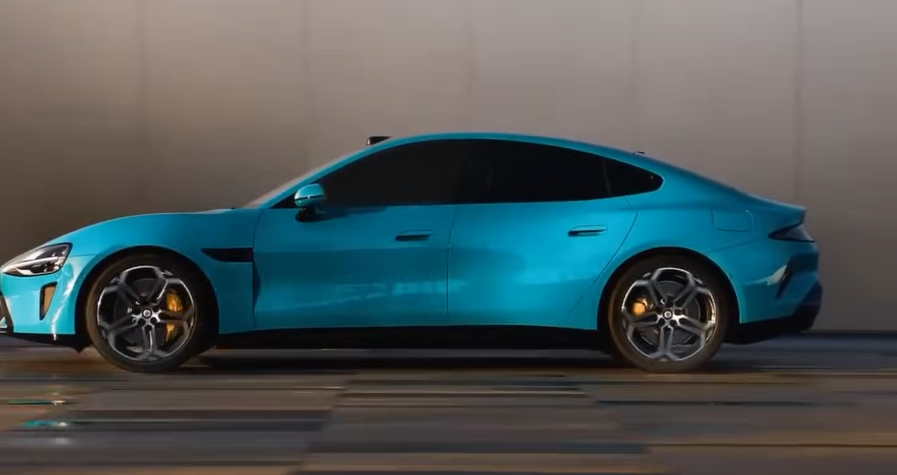
Chinese Xiaomi SU7 EV. (Source – YouTube).
China eyes EV market leadership as Xiaomi unveils first vehicle
- Xiaomi’s new EV, the SU7, challenges Tesla and Porsche.
- Xiaomi debuts its SU7 EV, aiming to shake up the luxury car market.
- China’s EV market flourishes with Xiaomi’s SU7 launch, underscoring the country’s pivotal role in global EV trends.
China is increasingly asserting itself as a significant contender in the electric vehicle (EV) market.
Xiaomi Corp.’s billionaire co-founder recently revealed the company’s first electric vehicle, the SU7, aiming to compete with industry leaders like Tesla Inc. and Porsche AG within the next two decades. This unveiling in Beijing featured the car autonomously entering the stage during a presentation by CEO Lei Jun.
The SU7: features and ambitions
At the event, held at the China National Convention Center, Lei Jun extensively discussed the SU7’s features. These include a remarkable range of 800 kilometers per charge, adjustable spoilers, various unique colors, and a top speed of 265 kilometers per hour.
The SU7, a five-seat sedan, will incorporate batteries from top Chinese manufacturers, Contemporary Amperex Technology Co. Ltd. and BYD Co., with single and dual motor configuration options.
Lei’s venture into the EV market signifies a significant US$10 billion investment, aiming to mirror Xiaomi’s disruptive impact in the smartphone industry. Lei considers this venture his ultimate entrepreneurial project.
At the launch event on December 28, Lei stated Xiaomi’s ambition to rival luxury car brands like Porsche and Tesla. However, China’s regulatory and competitive landscape, the largest car market globally, has significantly shifted since his 2021 EV announcement.
Xiaomi faces regulatory hurdles in China, including manufacturing permit limitations, necessitating a partnership with Beijing Automotive Group Co. for EV production. The end of significant state EV subsidies in 2022 further complicates the situation. The SU7 joins a crowded marketplace, with many models from various brands already in play or production.
Lei has positioned the SU7 alongside Porsche’s Taycan Turbo and Tesla’s Model S in terms of performance and technological features, respectively. Although these models are priced much higher, the SU7 is anticipated to be more affordable, though its exact price is yet to be revealed.
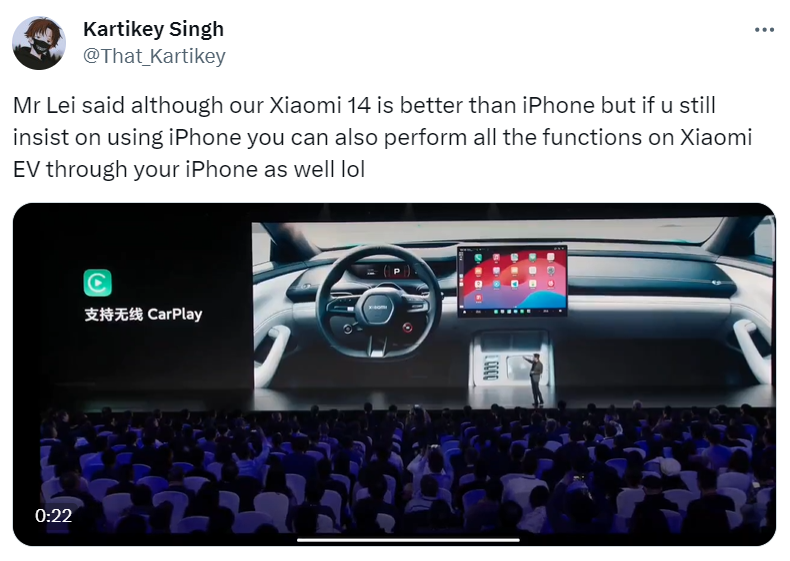
How a phone would work in the new Xiaomi’s EV car. (Source – X).
Addressing market speculation, Lei hinted that the SU7’s price would surpass the rumored 99,000 yuan, noting that similar spec models often cost over 400,000 yuan.
Tesla sold fewer than 200 revamped Model S vehicles in China in 2023. Porsche, meanwhile, delivered around 3,600 Taycan EVs in 2023, according to the China Automotive Technology and Research Center.
Slated for release next year, the SU7 boasts impressive acceleration, going from 0 to 100 kph in just 2.78 seconds. Its motor surpasses the RPM of both the Model S and Taycan Turbo. Xiaomi utilizes a gigacasting manufacturing process, similar to Tesla’s, but with its own advanced hypercasting system.
Xiaomi, evolving from its origins as a budget smartphone manufacturer, seeks growth in the saturated global market. Following a period of sales declines, the company is venturing into the EV market, competing with established and emerging players like Huawei Technologies Co.
Since committing to the SU7 project, Lei has personally tested over 150 cars. Xiaomi’s shares experienced slight fluctuations following the vehicle’s announcement. Lei describes the SU7 as a “performance beast,” targeting a consumer base that values technology, performance, and sophistication.
Global EV market trends and how China is evolving
Despite ending its subsidy program, China continues to lead in global EV sales, achieving record figures in October, as market research firm Rho Motion reported.
Although China concluded its 11-year EV purchase subsidy policy in 2022, some local governments still offer financial incentives and tax rebates to promote investment and consumer subsidies.
Even without subsidies, China, boasting the world’s largest auto market, saw a 29% increase in EV sales year-to-date as of September. This reflects the global EV market, which experienced a 34% growth during the same period.
Rho Motion highlights that China is entering its traditionally strongest sales period for this year. Notably, China’s EV demand continues to soar, reaching new heights in October despite the subsidy cut, with Rho Motion predicting another record-breaking year in EV sales for 2023.
In Europe, EV markets grew by 26%, although the cessation of subsidies, especially in Germany, has affected demand. Rho Motion notes the significance of this change in Germany, where commercial registrations make up nearly two-thirds of total passenger car registrations.
Major automakers like Tesla, Mercedes Benz, and Volkswagen have noted the impact of high interest rates and a subdued market environment in Europe on customer interest.
In contrast, EV sales in North America have surged by 78% this year. Rho Motion observes that while Tesla dominates the market, other established automakers are cautiously approaching production scale-up.
Despite price reductions, Tesla’s market share in the third quarter fell to a record low of about 50%, as reported by Cox Automotive in October. This decrease in market share occurred despite Tesla’s efforts to make its vehicles more affordable.
Lei Jun publicly acknowledged his industry peers on social media, including BYD, XPeng Inc., Li Auto Inc., and Huawei, lauding them as innovators in China’s new energy vehicle sector. On December 27, XPeng’s CEO He Xiaopeng took to Weibo to welcome Xiaomi to the automotive industry, expressing hope for strong sales in 2024.
Nio’s new flagship model and market expansion
It’s notable that Nio, another Chinese EV manufacturer, recently launched its flagship model featuring proprietary technology, including semiconductors. This launch is part of Nio’s strategy to boost earnings amid a competitive price war and a slowdown in car demand.
The ET9 executive sedan, set to compete with luxury models such as Mercedes Benz’s Maybach and Porsche’s Panamera series, is expected to begin deliveries in the first quarter of 2025. Priced at around 800,000 yuan (USS$152,355), this announcement was made by Nio’s founder and CEO William Li at the company’s annual “Nio Day” event.
At the event in Xian, Li showcased the ET9’s cutting-edge features, including Nio’s own autonomous driving semiconductor, a 900-voltage electric drive for faster charging, and sizable cylindrical battery cells.
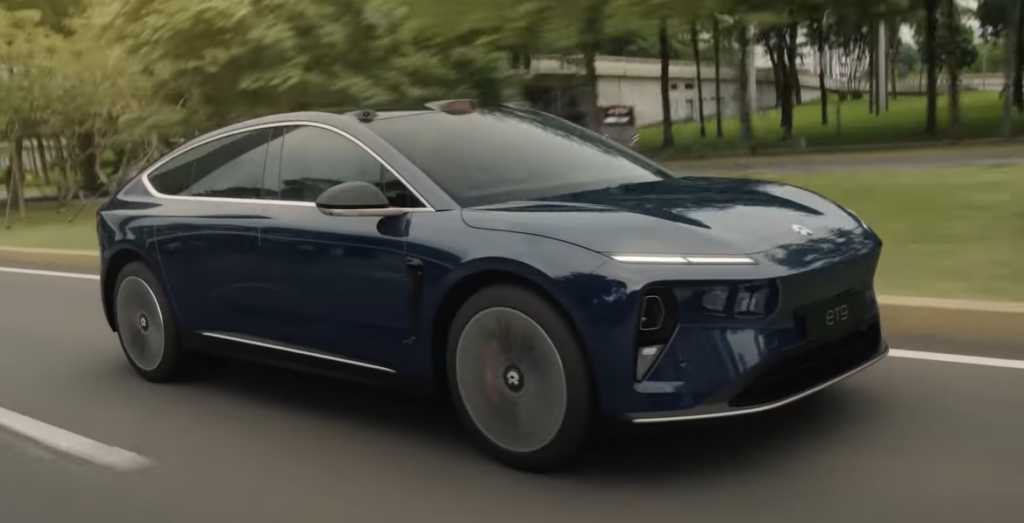
Nio announces the new smart electric executive flagship. (Source – YouTube).
Li also boasted about the sedan’s superior suspension technology, claiming it surpasses that of the Panamera. This technology is supplied by US startup ClearMotion, in which Li’s venture capital firm, Nio Capital, has invested.
Nio’s plans also include a significant expansion of its infrastructure, intending to double its public chargers and add 1,000 battery-swapping stations in China by 2024. This infrastructure development is expected to boost the appeal of Nio’s EVs to consumers and improve the company’s profit margins in a consolidating market.
This month, Nio secured a significant investment of US$2.2 billion from CYVN Holdings, an Abu Dhabi-backed entity, marking one of the most substantial investments in a Chinese EV company this year.
READ MORE
- Safer Automation: How Sophic and Firmus Succeeded in Malaysia with MDEC’s Support
- Privilege granted, not gained: Intelligent authorization for enhanced infrastructure productivity
- Low-Code produces the Proof-of-Possibilities
- New Wearables Enable Staff to Work Faster and Safer
- Experts weigh in on Oracle’s departure from adland

